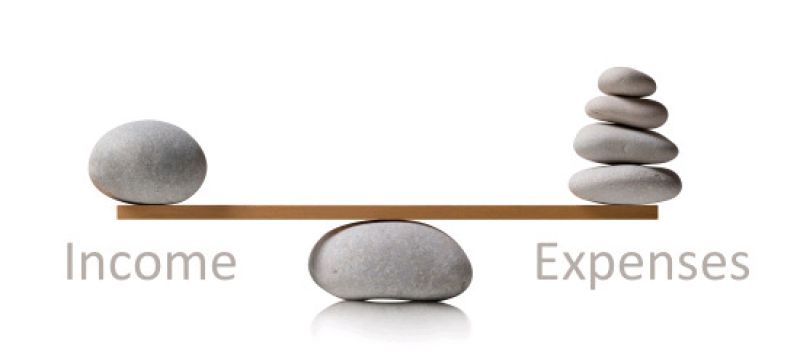By understanding the basics of budgeting, you can gain greater control over your finances and work towards achieving your financial objectives. Some of the Basics of budgeting include:

Budgeting is creating a plan for how you will manage your money. It involves estimating your income, identifying expenses, and allocating funds to different categories based on your financial goals and priorities.
The primary purpose of budgeting is to ensure that you have enough to solve your expenses, save for the future, and progress toward your financial objectives.
Also Read: The Benefits Of Tracking Your Expenses
What Does Budgeting Entail?

Budgeting involves several key steps:
1. Assessing Income
Begin by calculating your total income, including regular wages, salaries, freelance work, rental income, or any other sources of money.
2. Identifying Expenses
Track your expenses and categorize them into fixed and variable costs. Fixed expenses are recurring payments that remain relatively constant each month, such as rent/mortgage, loan repayments, insurance premiums, or utility bills.
Variable expenses are flexible costs that vary from month to month, such as dining out, groceries, entertainment, or transportation.
3. Setting Financial Goals
Determine your short-term, medium-term, and long-term financial goals. These goals include building an emergency fund, paying off debt, saving for a vacation or down payment on a home, funding education, or planning retirement.
4. Allocating Funds
Allocate your income to various categories based on your financial goals and priorities. This includes assigning money for essential expenses, such as utilities, housing, and groceries, as well as discretionary expenditures, such as entertainment and dining out. It is also vital to allocate funds for savings and investments.
5. Tracking and Monitoring
Please keep track of your expenses and compare them to your budgeted amounts. This helps you stay accountable and identify areas to adjust your spending. Use budgeting tools, spreadsheets, or financial apps to simplify the tracking process.
6. Making Adjustments
Regularly review and adjust your budget as needed. Be flexible and make modifications to accommodate changes in income, unexpected expenses, or shifting financial priorities. A budget should be a dynamic tool that adapts to your evolving financial situation.
7. Building Savings
Prioritize savings within your budget. Allocate a portion of your income towards building an emergency fund and saving for future goals. Consistency helps you create a financial safety net and work towards long-term financial security.
Also Read: How To Set Financial Goals And Achieve Them
Other Things to Note
Budgeting is a fundamental practice for managing personal finances effectively. It provides a clear breakdown of your income, expenses, and financial goals, allowing you to make informed decisions about your money.
By following a budget, you can control your spending, avoid debt, save for the future, and work towards achieving financial stability and success. Your ability to manage your money well may depend on your ability to create and adhere to a monthly budget.
Knowing how much money enters and exits your account regularly is a habit you should acquire, especially if you're starting.
It can help, as with any habit, to have the proper support. The greatest budget tool for you is the one you'll utilize, whether it's a full-featured app, a customized spreadsheet, or more manual methods.
Budgeting is an essential financial tool that helps individuals, families, and businesses effectively manage their money. It involves planning and allocating funds to meet expenses, save for future goals, and make informed financial decisions.
By understanding the basics of budgeting, you can gain greater control over your finances and work towards achieving your financial objectives.
Read Also: The Importance Of Financial Planning For Your Future
What are the Basics of Budgeting

Some key aspects to consider before thinking of budgeting include:
1. Income
Begin by evaluating your sources of revenue. This may include salary, wages, freelance work, rental income, or any other regular inflow of money. Understanding your total income is essential to develop an accurate budget.
2. Expenses
Track your expenses and categorize them into fixed and variable costs. Fixed expenses are regular payments that remain relatively constant each month, such as rent/mortgage, loan repayments, insurance premiums, or utility bills.
Variable expenses, on the other hand, are flexible costs that can vary monthly, like groceries, dining out, entertainment, or transportation. Identifying and categorizing your expenses will help you understand where your money is going.
3. Savings and Investments
A savings plan is crucial for financial stability and achieving future goals. Allocate a percent of your income towards savings and investments. Set specific targets for short-term goals (e.g., emergency fund), medium-term goals (e.g., vacation), and long-term goals (e.g., retirement).
Consider other savings and investment options that align with your risk tolerance and financial objectives.
4. Budgeting Methods
Various budgeting methods depend on your preferences and financial situation. The traditional envelope system involves allocating cash into different envelopes for each category of expenses.
Digital tools and apps provide automated tracking, categorizing, and analyzing your income and expenses. Zero-based budgeting requires assigning every dollar of your income to a specific purpose, ensuring that your payments equal your income, with no money left unallocated.
5. Adjustments and Flexibility
Your budget should be flexible and adaptable as your financial circumstances change. Regularly review and adjust your budget to accommodate unexpected expenses, changes in income, or shifting priorities. Be prepared to make necessary modifications to maintain realistic and sustainable funding.
6. Financial Goals and Priorities
Clearly define and prioritize your financial goals within your budget. Whether it's paying off debts, saving for a home down payment, funding education, or planning for retirement, align your budget with these objectives. Assign a portion of your income towards each goal and track your progress regularly.
7. Monitoring and Accountability
Regularly monitor your budget, track your expenses, and compare them with your allocated amounts. Use financial tracking tools or apps to simplify this process. You can note areas you might be overspending or chances for more savings by regularly reviewing your budget.

